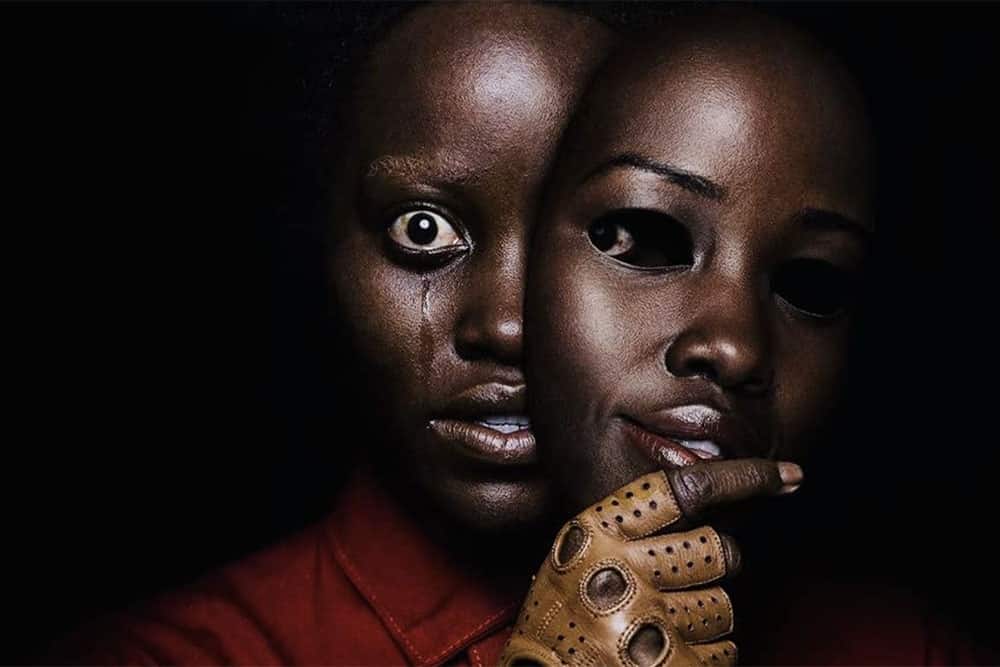
With his second feature, the spectacularly unnerving Us, writer/director Jordan Peele has officially entered M. Night Shyamalan territory. To be fair, while just as confident and competent an auteur, Peele exhibits few signs of that up-down-and-up-again filmmaker’s self-importance. But after showing that he could blow up expectations of both horror movies and social satires with Get Out while at the same time securing Oscar attention, he may be sowing the seeds of his demise by outdoing himself.
Us takes pieces from a few different genres, particularly home-invasion thrillers and subtext-laden George A. Romero-esque zombie movies, and stitches them together into a uniquely weird and hammer-intense experience. The primary storyline, in which a middle-class family is besieged in a summer vacation home by a red jump-suited and scissor-wielding gang, would be enough for some other films.
Peele’s vision, however, is wider. Not only are the murderously intent but dazed-seeming invaders doppelgängers for the family (played by the same actors as well), but when asked who they are, the leader croaks out like a wheezing corpse, “We’re Americans.”
Like almost every family ever menaced on-screen by dark forces, the Wilsons are a generally happy bunch on the surface, though with issues buried not far beneath. Arriving at their lake house, they bicker lightly and brightly, buoyed by their happy dork of a father, Gabe (Winston Duke), and his seemingly endless supply of bad dad jokes. While the remove of their restive, smartphone-glued teenage daughter Zora (Shahadi Wright Joseph) is somewhat par for the course in terms of film family dynamics, the other half of the clan has seemingly deeper issues.
The young boy Jason (Evan Alex), doesn’t speak much and prefers to face the world from behind a dime-store Halloween monster mask, which is not creepy at all. As for their mother, Adelaide (Lupita Nyong’o), she’s still working through the buried trauma of a childhood scare we are given a glimpse of in the pre-credits—the short hand of which is that she really does not like beaches.
So, of course, the Wilson family goes to the beach. That’s where they meet their friends, the Tylers, a fairly crass bunch whose parents Kitty (Elisabeth Moss, a standout) and Josh (Tim Heidecker) are a boozy consumerist mess who nevertheless provide garish comic relief. This beach is also the same beach at Santa Cruz, where Adelaide got lost as a child. She ended up in a haunted house of mirrors and meeting a girl who looked exactly like her. It’s inevitable that no matter Adelaide’s watchfulness, Jason will go off on his own and see a house of mirrors that looks quite similar.
Unlike Get Out, which played initially as a keenly observed social satire with ominous hints before taking its full plunge into horror, Us signals what it is from the start, only to veer into far stranger places. Peele stocks the first stretch of Us with numerous horror-movie tropes. (There might be a few theses’ worth of meaning layered throughout, but this is still a film meant to play at the multiplex.) These range from creepy basements to creepy spiders, houses with far too many windows to safely barricade inside, a shivery choral score (courtesy of Michael Abels), and characters walking towards threatening presences while calling out, “Hello?”
There are also call-outs here to a range of genre flicks, from Steven Spielberg’s Jaws (1975) to Joel Schumacher’s Lost Boys (1987), and a particularly well-worn scary-movie favorite: the silently ominous drifter, in this case, a homeless man on the boardwalk with a sign whose Bible reference does not auger well for what is to follow (Jeremiah 11:11, by the way).
Even inside the web of references, though, Peele carves out his space. He shows a deft hand at managing the interplay of family dynamics—helped particularly by Nyong’o and Duke’s warm yet wrenching performances—while keeping up a line of comic banter and acutely observed racial commentary that keeps flickering even as the story veers from home-invasion survival to a more apocalyptic kind of score-settling. He also exhibits bravery for moving beyond the strict rules of genre and toward a deeper and more inexplicable kind of dark fantasy.
While not likely to be described as a heavy filmmaker, there’s too much of the storyteller and joke-spinner in Peele, he has that Rod Serling impulse, which keeps drawing his films toward broader messaging. In the case of Us, the scope is especially large, given how the doppelgängers start seeming less like mere threats and more like distorted mirrors reflecting only the worst in each person.
Even with two modern classics under his belt now, there’s good reason to believe Peele has a chance of staying out of Shyamalan territory. He’s unlikely ever to make his own The Lady in the Water. And the further he ventures out of genre territory and into the unmapped fields of fantastical American strange, the more exciting an artist he will be.
- Framing White Nationalism in Spike Lee's 'BlacKkKlansman ...
- The Darkness Within: 13 Films That Burrow into Our Psyches ...
- 'Get Out' Is a Fantastic Freak-Out - PopMatters
- American Basement: Race and Horror in the Architectural Imaginary ...
- Maybe What's Going on in 'Get Out' Is All in His Head - PopMatters
- HBO's 'Lovecraft Country' Is Heady, Poetic, and Mangled - PopMatters

